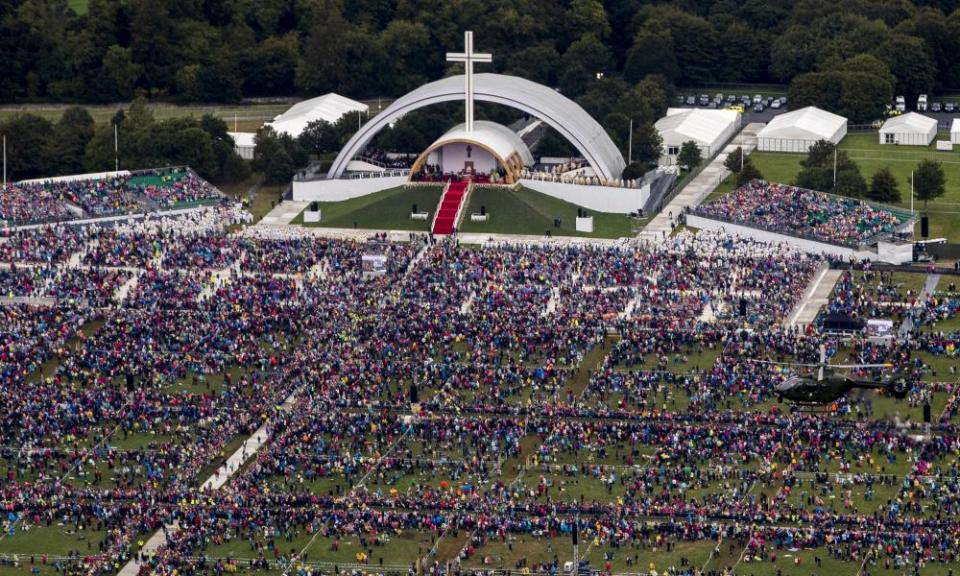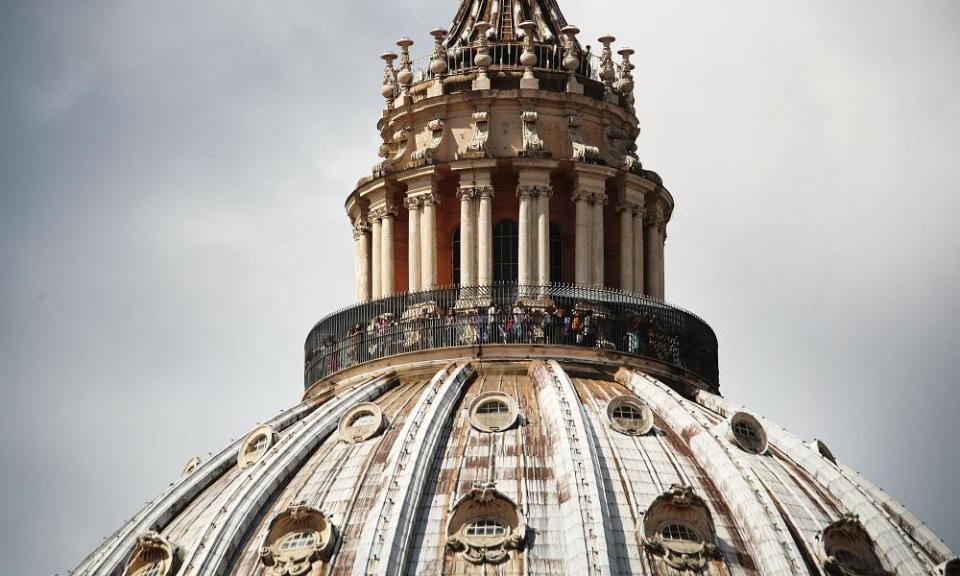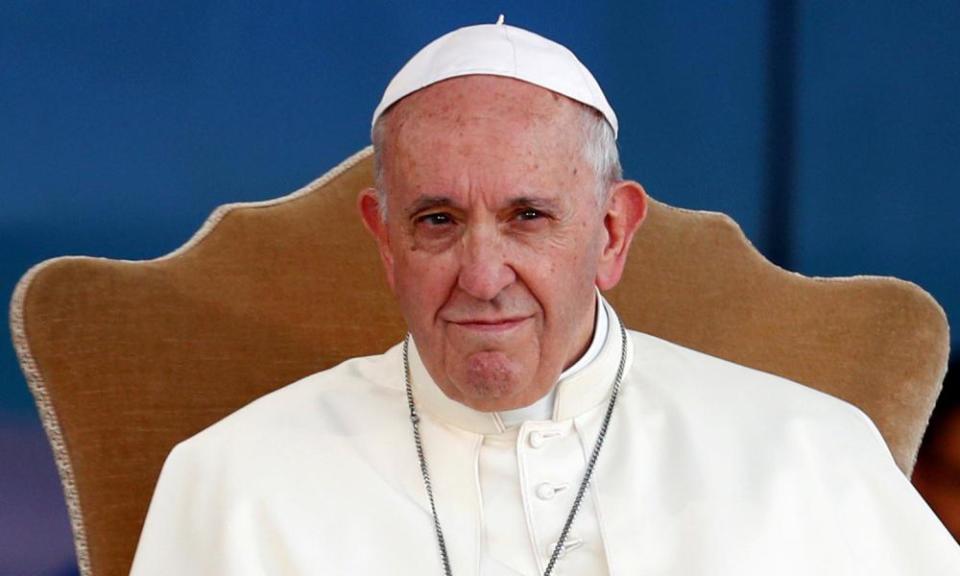Pope Francis faces worst crisis of his five-year papacy

Ever since he was elected as the leader of the world’s Roman Catholics, Pope Francis has been the target of conservative adversaries deeply opposed to his focus on the poor and marginalised, and his efforts to reform the church.
But in the past week, the war at the heart of the Vatican has exploded into the open, plunging Francis into the worst crisis of his five-year papacy. Cardinals and bishops have openly fired shots; accusations of lies, treachery, score-settling, character assassination and fake news have engulfed the global church.
The touchpaper was lit while Francis was on a challenging trip to Ireland last weekend. The painful legacy of sexual abuse cover-up cast a long, dark shadow over his visit; however many times Francis spoke of the church’s shame and sorrow, it was not enough for survivors who demanded action. The highlight, an open-air papal mass in Phoenix Park, was attended, according to some estimates, by a quarter of the 500,000 expected.

In the middle of this, a retired Vatican diplomat released an incendiary 11-page letter claiming Francis had known of abuse allegations against a high-ranking church figure from 2013, but failed to take action.
Archbishop Carlo Maria Viganò, 77, a former Vatican ambassador to the US and a conservative within the church, said the pope knew that Theodore McCarrick, the former archbishop of Washington, “was a corrupt man, [but] he covered for him to the bitter end”.
Viganò named a string of cardinals and archbishops who he said also knew about the McCarrick claims. “Corruption has reached the very top of the church’s hierarchy,”; Francis should resign, he said.
The letter was released as the issue of abuse was already engulfing the church and its leader. In July, Francis had accepted McCarrick’s resignation as a cardinal following fresh claims of sexual abuse, which the former archbishop denies. In Pennsylvania, a grand jury report contained devastating details of clerical sex crimes and their cover-up; an Australian archbishop was convicted of concealing child abuse; in Chile, 34 bishops offered their resignation in a cover-up scandal. Further criminal trials of high-ranking church figures are scheduled in the coming months. Facing scandals on multiple fronts, Francis released an unprecedented missive to the world’s Catholic faithful, publicly acknowledging the church’s failures.
Viganò’s claims – timed when Francis was already vulnerable – unleashed opposing forces within the church. The old guard of the Curia – the Vatican’s governing bodies, a hotbed of power struggles, intrigue and paranoia – bitterly resents Francis’s efforts to root out what they view as centuries of clerical tradition and he sees as hypocrisy, narcissism and “spiritual Alzheimer’s”. Now the gloves were off.

Francis loyalists leaped to his defence and lambasted the former diplomat. Robert McElroy, the bishop of San Diego, said Viganò’s letter contained “clear efforts to settle old personal scores” and promoted a “hatred of Pope Francis and all that he has taught”. Viganò “consistently subordinates the pursuit of comprehensive truth to partisanship, division and distortion,” he added.
Bishops in Argentina publicly supported their compatriot, saying Viganò had made a “ruthless” attack on the pope. Bishops in Spain and Peru issued similar statements, with the Peruvians denouncing “attempts to destabilise the church”.
The head of a Latin American bishops’ council, Cardinal Ruben Salazar of Bogotá, condemned “attacks on the pope as a person”. Father Antonio Spadaro, an Italian Jesuit and staunch defender of Pope Francis, warned of “fake news”.
But others said Viganò’s allegations must be taken seriously. Salvatore Cordileone, archbishop of San Francisco, said Viganò was a man of integrity and “selfless dedication”. “To dismiss [his claims] lightly would continue a culture of denial and obfuscation.”
Robert Barron, auxiliary bishop of Los Angeles, said: “This is not some minor player, this is the former Apostolic Nuncio to the United States … He’s making some serious claims, and I’d say look into them. Let’s take an honest, objective look at what’s being claimed here.”
More than 29,000 people have added their names to an open letter to Francis from the US-based Catholic Women’s Forum, asking for a direct response to Viganò’s “devastating” allegations. “Our hearts are broken, our faith tested, by the escalating crisis engulfing our beloved church … Each news cycle brings more horrific revelations of sexual abuse, sexual misconduct, cover-ups and deceit – even at the church’s highest levels.” It asks for “leadership, truth and transparency”.
In a sub-plot to Viganò’s main claims, the pope’s allies have rebutted allegations over Francis’s 2015 controversial meeting with Kim Davis, a former county clerk in Kentucky who refused to sign same-sex marriage licences, citing religious freedom. The meeting, which dismayed liberals who saw it as a papal endorsement of Davis’s stance, was set up by Viganò. On his return from the US, the pope summoned Viganò to Rome for a dressing-down.
However, Viganò claimed that, in his meeting with Francis, the Davis meeting was not discussed. That was challenged in a statement released on Monday by Federico Lombardi, former Vatican press officer, and Thomas Rosica of the Salt and Light Catholic media foundation, which quoted from contemporaneous notes.
Viganò has stood by claims made in his letter, saying his critics are out to destroy his credibility. “The light always conquers the darkness. It cannot be suppressed, especially for the one who has faith,” he said.
In the coming weeks, Cardinal Daniel DiNardo, president of the US bishops’ conference, is expected to travel to Rome to press for an Apostolic Visitation – a high-level Vatican inquiry – into the McCarrick case.
In a statement after Viganò’s letter, DiNardo said: “The questions raised deserve answers that are conclusive and based on evidence. Without those answers, innocent men may be tainted by false accusation and the guilty may be left to repeat sins of the past.”

Any such inquiry is bound to investigate who knew what and when – right up to the Vatican and the Holy Father himself. But scepticism about the integrity of a Vatican investigation that could uncover wrongdoing at the pinnacle of the church is inevitable.
The pope has said little apart from appealing to people to make their own judgment. According to his secretary of state, Cardinal Pietro Parolin, his mood is “serene” in the face of raging controversy.
On Monday, Francis delivered a homily focusing on Jesus’s dignity when confronted by those “who wanted to throw him out” of Nazareth. Jesus’s silence triumphed over his attackers, he told the congregation; “truth is humble, truth is silent.”
He concluded: “May the Lord give us the grace to discern when we should speak and when we should stay silent. This applies to every part of life: to work, at home, in society … Thus we will be closer imitators of Jesus.”

 Yahoo News
Yahoo News 
